LATEST:
Beijing orders all companies to supervise 14-day home quarantine for employees who have visited the Xinfadi market or been in contact with anyone who has.Beijing confirms eight new coronavirus cases recorded in the first seven hours of the day. Health officials from the city say all eight cases are linked to the Xinfadi market, a major food wholesale market in the city's southwestern Fengtai district. All 43 cases reported in Beijing during the previous three days also have been linked to the market.
(China reports 57 new confirmed cases for Saturday, the highest count since April 13, according to data released by the national health authority. Thirty-six of the new cases were in Beijing.)
By Guo Meiping, Gao Yun, Pan Zhaoyi
CGTN
https://news.cgtn.com/news/2020-06-14/Off-the-shelves-in-Beijing-is-salmon-guilty-of-spreading-coronavirus--Rj33sh4b8Q/index.html
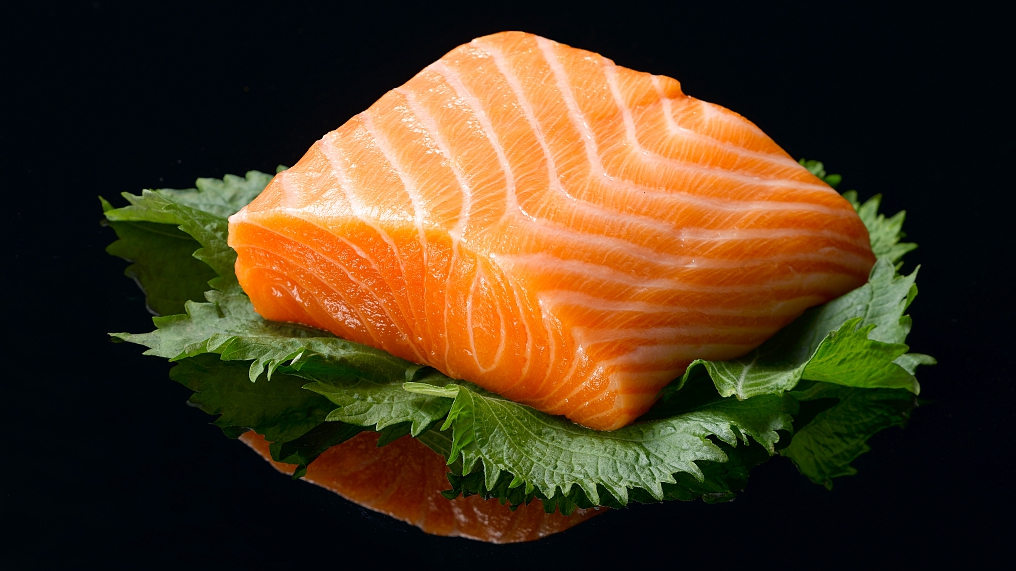
Beijing's largest vegetable wholesale market, Xinfadi market, was shut down Saturday after six new domestic COVID-19 infections and 45 asymptomatic cases were reported and the novel coronavirus was detected on some of the sellers' equipment.
According to local health officials, the virus was found on a chopping board used by a seller of imported salmon, sparking speculations on whether the fish can spread the virus.

Xinfadi market, the largest vegetable wholesale market in Beijing. /VCG
"At present, it is hard to determine the infection source in the market," Wu Zunyou, chief epidemiologist at the Chinese Center for Disease Control and Prevention (CDC), told China's Central Commission for Discipline Inspection.
"We cannot conclude that salmon is the source of infection just because novel coronavirus was detected on a chopping board of a seller," the expert said, adding that the chopping board could be contaminated by infected owner or guests, or other products that carried the virus.
The known hosts for coronavirus are mostly mammals. It's almost impossible for salmon to get infected with COVID-19, Cheng Gong, virologist at Tsinghua University, explained.
"Virus must rely on the viral receptor on the host cell surfaces to infect cells. Without the certain receptor they cannot enter into cells successfully," Cheng added. "All known evidence so far suggest this kind of receptors exist only in mammals, not fish."
A study conducted by University College London also suggests that the novel coronavirus can infect a broad range of mammals, but not fish, birds or reptiles.
"The market has a large flow of people and products, it's difficult to figure out the infection source in a short time," said Wu. "We need to collect samples from different channels for verification… and have all related people and products examined to understand the whole picture."
Can we still eat salmon?
The priority now is to find the source of the coronavirus detected on the chopping board, pointed out Zhong Kai, expert from Chinese Preventive Medicine Association, who advised the public to not eat raw salmon until the results of the investigation are revealed.
No evidence has shown that the novel coronavirus can be transmitted directly through food and drink to humans, said Zhong, as the major transmission routes remain respiratory droplets and close contact.
However, the virus can survive on the surface of an object for hours to a few days, and chilled salmon was transported by air in a low temperature, under which condition "it is theoretically possible for the virus to survive, but the possibility is low," said Zhong.
Compared to eating, the process of purchasing and cooking faces a higher risk. Below are some tips from China's CDC that you can follow to protect yourself from the virus.
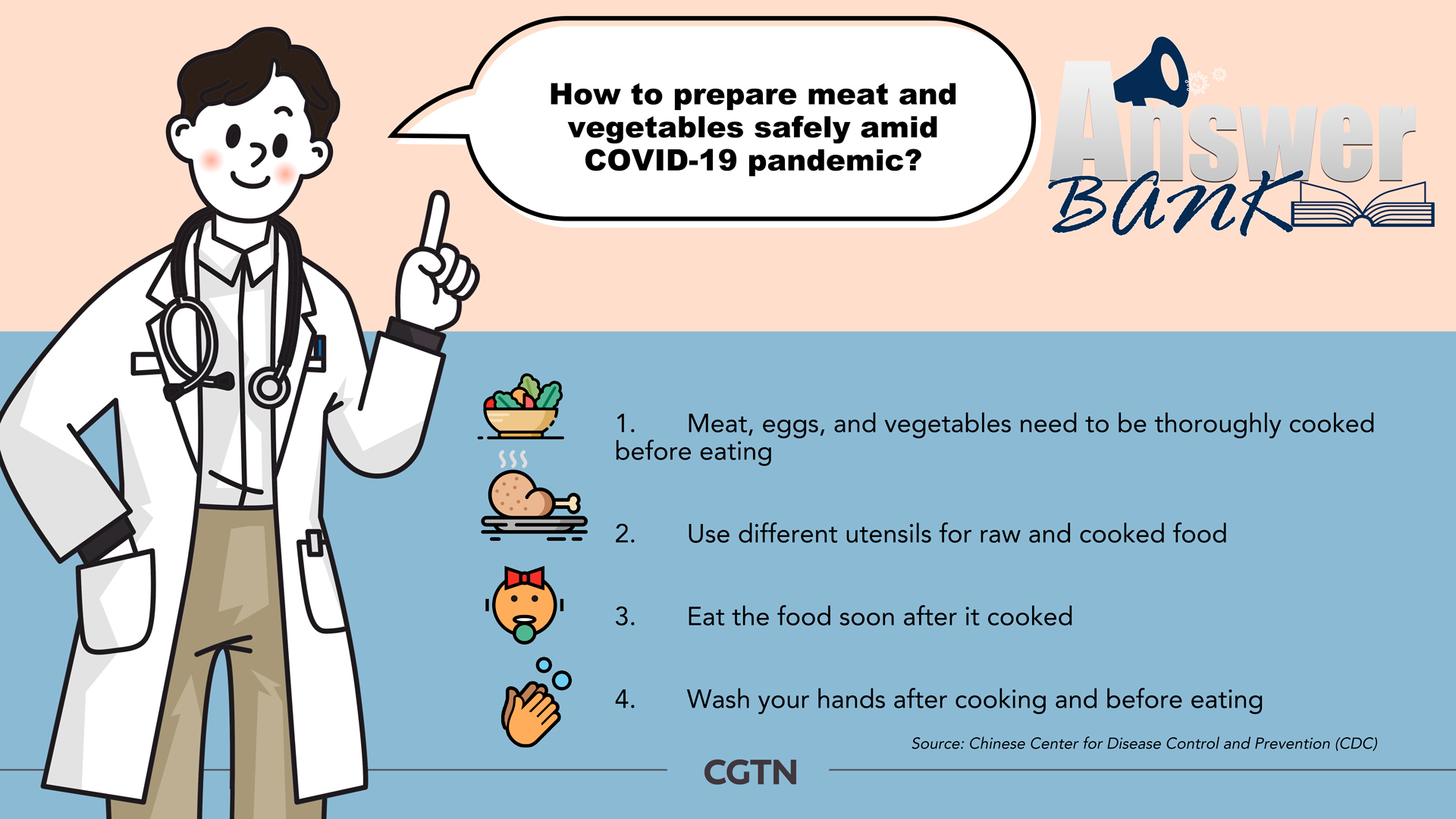
Designed by Li Yueyun
For ordinary consumers, Zhong also highlighted the importance of daily protection, such as wearing masks when going out, and washing hands upon entering the house as well as before and after cooking food.
Can fish get infected by coronavirus?
Unlike wild animals like civets and bats which are hosts of coronavirus, fish naturally do not carry coronavirus in their bodies, Wu explained, providing one possibility that the surface of the fish could get contaminated by infected workers.
"And if contaminated fish were shipped to China, Chinese workers could have been infected as they processed the fish, and then that led to further human-to-human transmission," he added. "But this is just one speculation, further confirmation is needed through epidemiological investigation."
Wu called on the authorities to tighten inspection and quarantine on imported and refrigerated products to prevent the risk of further viral transmission.
(Cover via VCG)
Fears of a second coronavirus wave rise in China as Beijing battles new cluster
LA TIMES
https://www.latimes.com/world-nation/story/2020-06-14/fears-of-a-second-wave-rise-in-china-as-beijing-battles-new-cluster-of-coronavirus-infections
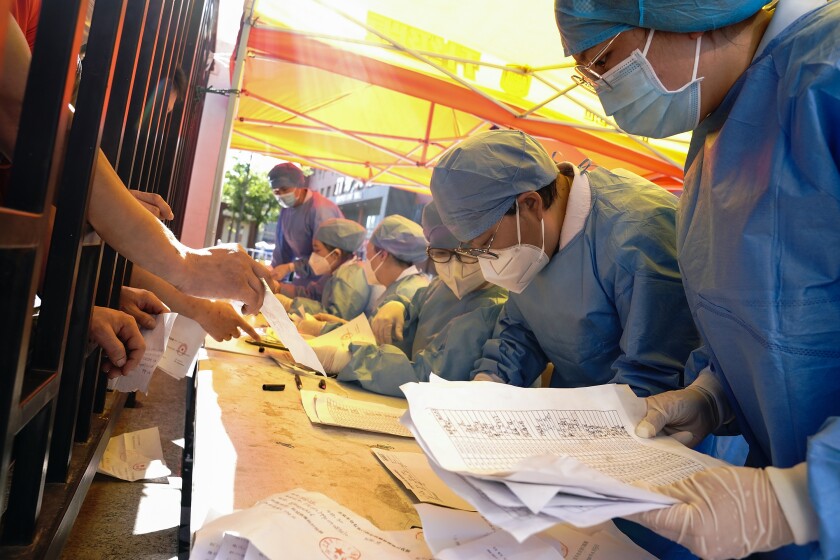
Medical workers in protective gear check the names of people waiting to get a COVID-19 test in Beijing.
(Lintao Zhang / Getty Images)
By ALICE SUCHINA CORRESPONDENT
JUNE 14, 2020
1:48 AM
Fears of a second wave of coronavirus infections struck China’s capital city as a new cluster was discovered over the weekend, centered on a massive seafood, meat and produce market in the southern Fengtai district of Beijing.
Beijing’s health authorities reported six confirmed cases Saturday and 36 new cases Sunday, with an additional eight cases reported late Sunday afternoon. All were locally transmitted infections, breaking a months-long trend of China reporting mostly imported COVID-19 cases while the domestic transmission seemed to be largely under control.
It is a stark reminder that virus can return after months of seemingly no local spread — even in one of the most tightly controlled cities in a country that has taken severe measures to halt transmission at home and from abroad.
How the new patients became infected remains unclear. But Chinese authorities have zeroed in on the new cases’ shared links to Xinfadi market, a sprawling wholesale market that supplies more than 70% of Beijing’s fruits and vegetables, according to local news reports. The market also includes wholesale sections dedicated to beef, lamb and seafood.
Two of the newly infected people were employees at the China Meat Research Center, a food research institute in the same district. Most of the others were either workers at Xinfadi — drivers, vendors, delivery people — or close contacts of market workers.
Xinfadi was closed at 3 a.m. Saturday after at least two of three patients found Thursday and Friday reported having visited the market. Police were sent to patrol Xinfadi as authorities sent guards to lock down 11 communities around the market and close nine schools and kindergartens that had already resumed classes.
At least 139 close contacts of the newly infected people were put in quarantine.
By midday Saturday, Beijing authorities said they had collected more than 5,000 environmental samples from major wholesale markets around the city, including 1,901 swabs from the floors, tables, products, door handles, trash cans and other surfaces at Xinfadi.
They found 40 samples with traces of the coronavirus at Xinfadi, including from the chopping boards used for cutting salmon.
Major supermarkets across Beijing pulled salmon off their shelves overnight. Some restaurants refused to sell items with salmon Saturday.
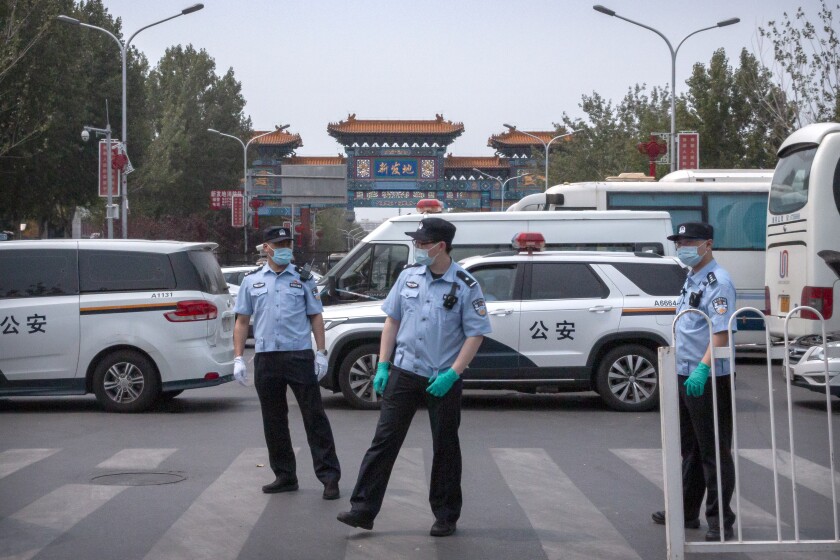
Police stand guard outside an entrance to the Xinfadi wholesale food market district in Beijing on Saturday.
(Mark Schiefelbein / Associated Press)
Authorities mobilized mass testing in the Fengtai district Saturday and required neighborhood workers to call residents one by one, screening for anyone who’d visited Xinfadi in recent days. More than 10,000 market workers and close contacts will be tested, as will anyone in Beijing or neighboring Tianjin city and Hebei province who has visited Xinfadi or has had close contact with Xinfadi visitors since May 30.
Tourism and sports events have been banned. A long-distance-bus station near Xinfadi has been closed. A plan to allow Beijing students in first through third grades to resume classes Monday was canceled.
Beijing, home to most of the country’s highest-ranking elites and Communist Party officials, had some of the strictest COVID-19 restrictions in China and was among the last to relax them. For months, international flights have been rerouted to nearby cities, with passengers required to be tested and isolated for 14 days before they can enter the city.
Beijing had finally relaxed its restrictions this month after the postponed Two Sessions, China’s most important annual political meetings, took place in late May. Three thousand delegates from across the nation were tested and isolated before they could attend, while the few journalists permitted entry could only do so after they had received negative results from same-day COVID-19 tests.
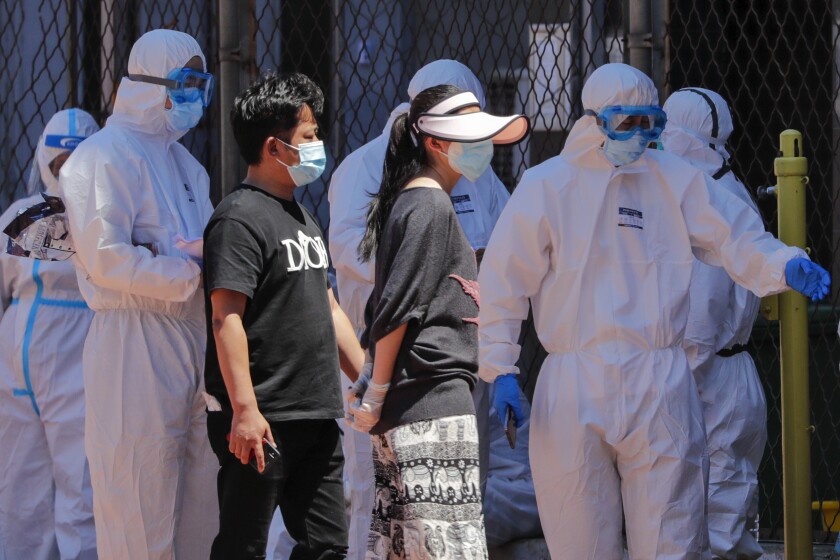
Workers in protective suits direct people waiting to be tested for COVID-19 at a Beijing stadium on Sunday.
(Andy Wong / Associated Press)
In recent days, Beijing had all but returned to normal. More people removed their masks while exercising outside. Restaurants still had QR codes to scan and track customers’ health conditions, but few were enforcing their use.
Bored security guards pointed thermometer guns past people as they entered malls and apartment complexes, not bothering to check if a temperature was displayed.
Those restrictions are now tightening again. Guards blocked shoppers from entering a popular shopping mall Saturday afternoon, insisting they display green QR codes proving their health status.
“Haven’t you heard about the new cases?” one guard hollered at a resistant young woman.
Concerns over food safety and prices have risen, as health experts scramble to answer questions about whether frozen food, produce or food packaging can carry the coronavirus. Reports that at least one of the confirmed cases was a restaurant worker have added to the anxiety. Several other cities have warned their residents not to visit Beijing.
“Beijing has entered a critical period,” Xu Hejian, a spokesman for the Beijing city government, said at a briefing Sunday.
Yang Peng, an expert at the Chinese Center for Disease Control and Prevention in Beijing, said in an interview with state channel CCTV on Sunday evening that a whole-genome test of the newly found virus infections indicated that they came “from the direction of Europe.”
Chinese experts’ initial conclusion was that there was imported transmission into the market, he said, though the exact path remained unclear.
It could have been contaminated seafood or meat, or transmission through respiratory droplets from people entering the market, Yang said. Evidence showed human-to-human transmission took place in the market, he said, but infection via touching surfaces was also possible.
Most of the positive samples taken at the market were found in the basement level of the meat and seafood exchange buildings, he said, an enclosed space with less air circulation.
The reappearance of a local COVID-19 cluster is a critical reminder that China — and most of the world — should not relax, because we do not have herd immunity, Yang said.
“It’s still a very complicated new virus whose rules we have not clearly grasped. Our immunity remains very low,” he said. “We still have to stay in a wartime mode.”











